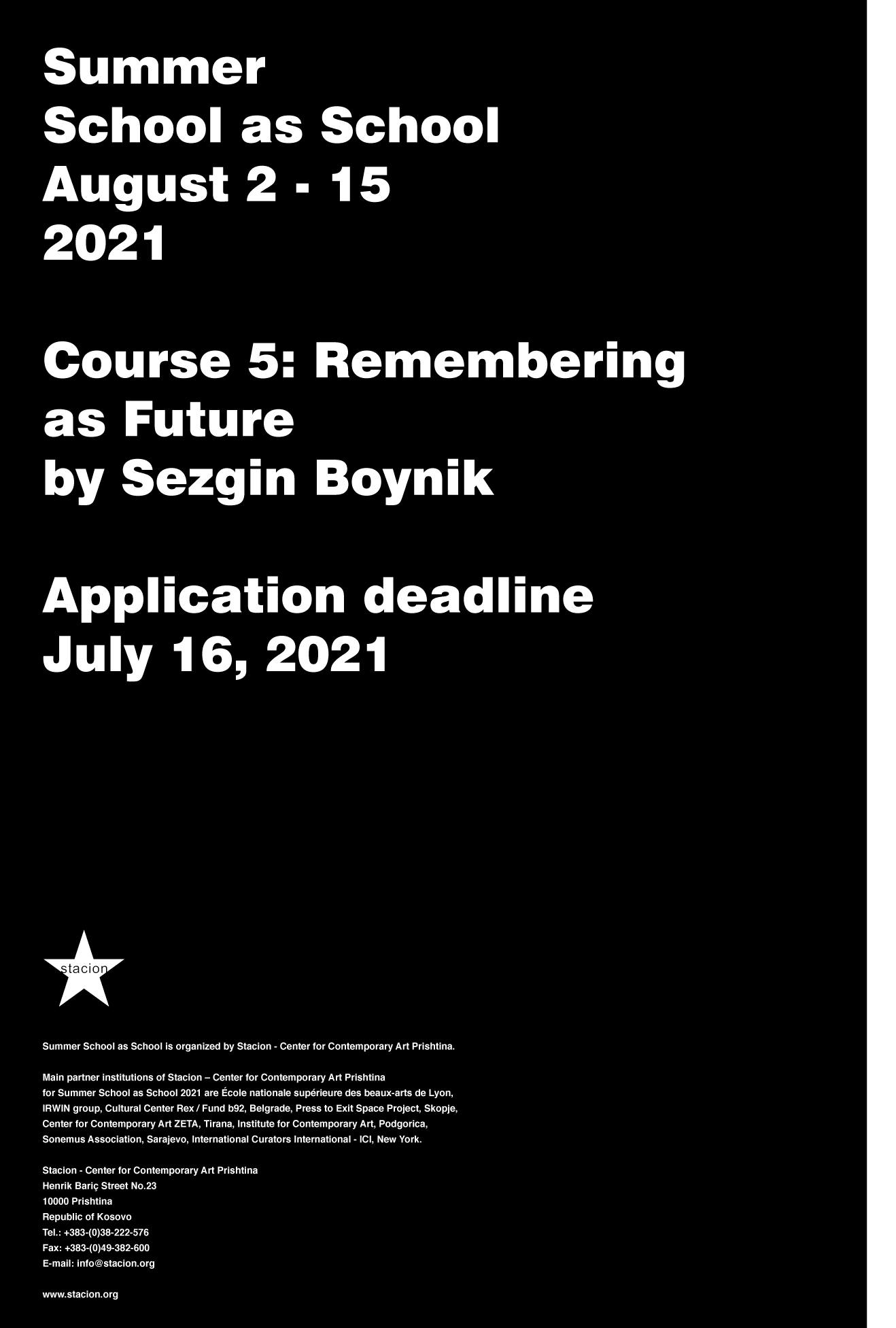
Course 5: Remembering as Future
by Sezgin Boynik
2 – 7 August, 2021
2 ECTS
Application deadline: July 16, 2021.
Course Description
The course will deal with the artistic legacy of the avant-garde left. By focusing on recent projects of actualising avant-garde art, the course will discuss the theoretical and historical importance of these practices for today’s forms and struggles. The starting point of the course begins with the idea that the avant-garde left, especially of the twenties and the thirties, were openly engaging with unresolved social contradictions and antagonisms. This impure form of the avant-garde left’s ethics transformed the relationship between art and politics on two levels:
a. By introducing radical dialectics, whose effects were felt beyond the art institutions;
b. By experimenting with the actual social demands of the day and seeking new forms of representation based on transformation and excess.
In the course we will discuss the outcomes of avant-garde dialectics based on excess by focusing on three recent works which actualise avant-garde forms.
Yanko, Albanian King by Ilya Zdanevich - a play based on zaum (non-sense) language first published in 1918 in Tbilisi. The play is about Yanko, a donkey declared a king in Albania, and is one of the the most excessive Dadaist works to criticize war, imperialism, nationalism, and the ancien regime. The publication, which includes the first translation of Yanko, Albanian King and extensive materials contextualising its making, is forthcoming from Shuplak-Shuplak Press (Prizren, 2022)
Art Market by Karel Teige - a book by Teige written in 1936, during the crux of the most severe conflicts between the artistic experiments and political engagements of Surrealist internationalism. The book is the condensation of Teige’s philosophy based on uncompromising dialectics of opposites, and is the document of the last attempt to think art beyond capitalist institutions and Stalinist trials. The first translation of the book with theoretical and historical interpretations will be published by Rab-Rab Press/Contradictions (Helsinki/Prague, 2021).
Sickle of Syntax and Hammer of Tautology - an anthology offering the first English language overview of the history of concrete and visual poetry production in socialist Yugoslavia between 1968 and 1983. It focuses on the experimental poetry published in mass produced periodicals and discusses the forms of concrete and visual poetry as an attempt at democratisation of avant-garde art. The anthology is published as a special edition of OEI magazine issue 90-91 (Stockholm, 2021).
Biography
Sezgin Boynik is a theoretician based in Helsinki. He completed his PhD on Yugoslav “Black Wave” cinema. He co-edited Nationalism and Contemporary Art: Critical Reader (MM & Exit, 2007) and History of Punk and Underground in Turkey (BAS, 2008). Recent publications include Noise After Babel: Language Unrestrained (Spector Books, 2015, with Minna Henriksson), In the Belly of the Beast: Art & Language New York Project (Rab-Rab Journal Vol. 4, No. 2, 2017, with Michael Corris) and Coiled Verbal Spring: Devices of Lenin's Language (Rab-Rab Press, 2018). He is currently working on a monograph about the theoretical and political context of Black Audio Film Collective and on the collection of Yugoslav concrete poetry. He is editor of Rab-Rab: Journal for Political and Formal Inquiries in Art, and Rab-Rab Press, an independent publishing platform based in Helsinki.
Participation
10 participants will be selected to participate in this course. Eligible participants must read the Terms information, fill out the application form, upload the required documents and submit the application form. Incomplete applications will not be considered.
Scholarships are available for participants from Kosovo.
A limited number of scholarships that cover the participation fee are available for international participants.